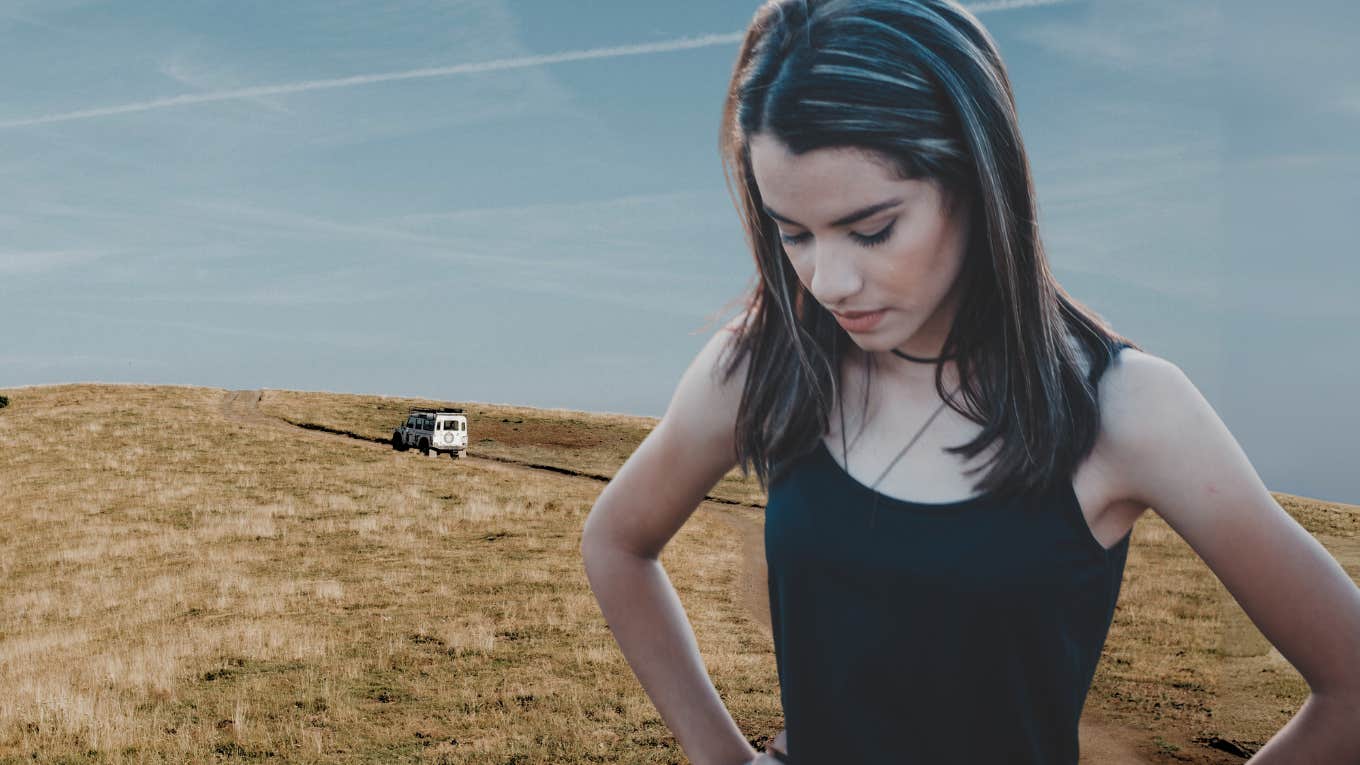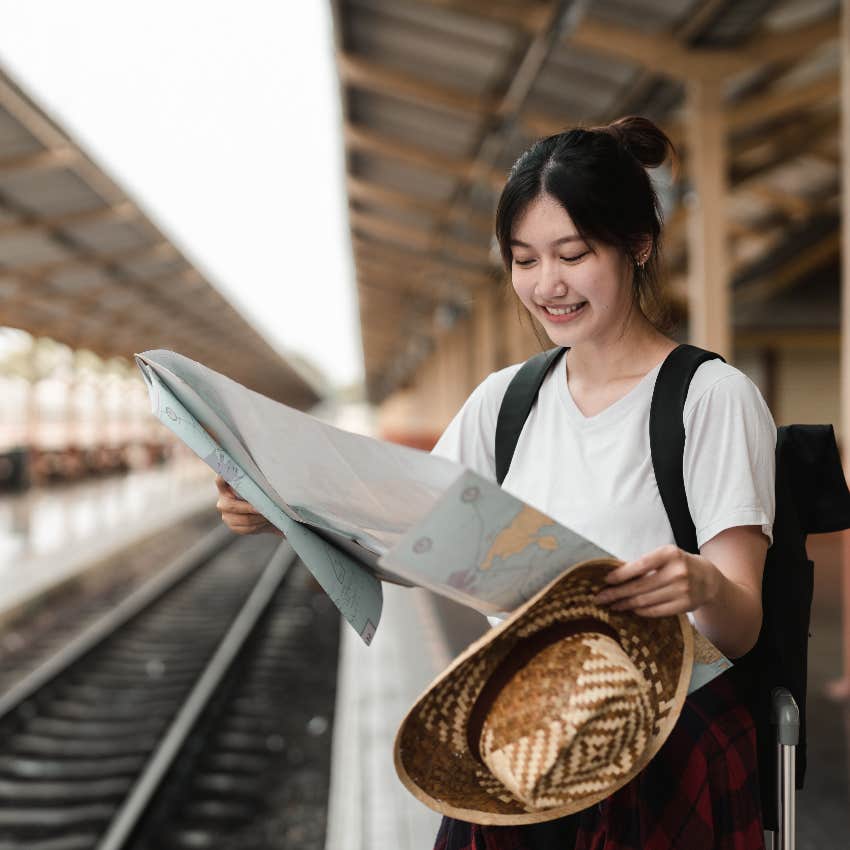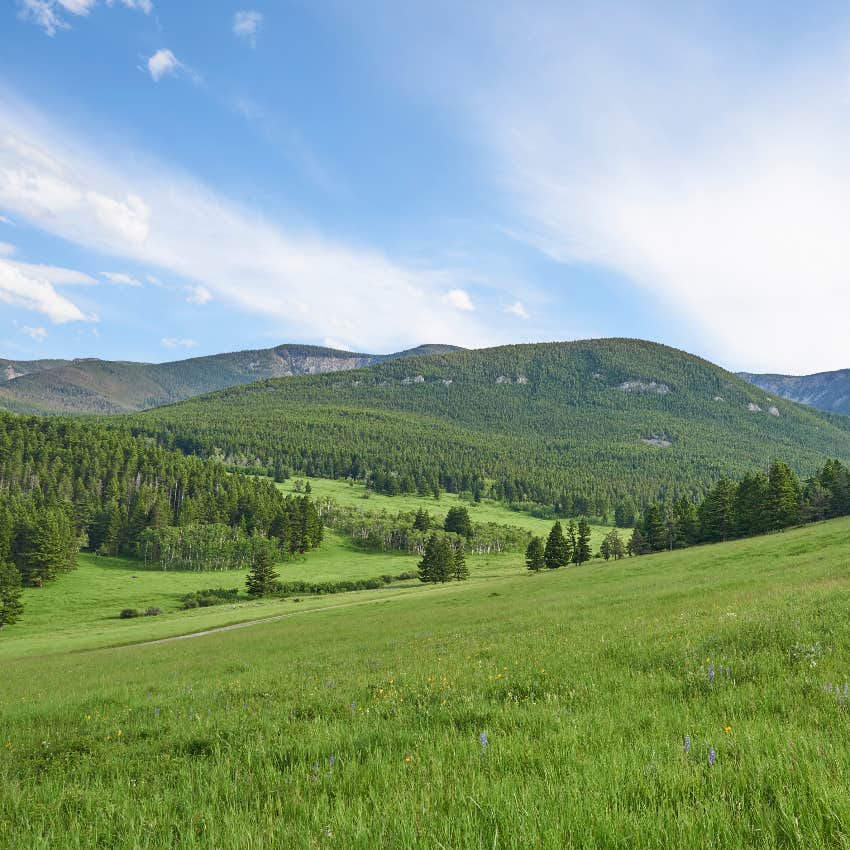The First Time I Thought, “He Might Rape Me”
Coming to terms with female vulnerability.
 Jan Padilla, Marcelo Matarazzo | Unsplash
Jan Padilla, Marcelo Matarazzo | Unsplash It was when he veered his truck off the road that I wondered if I was going to make it out alive. Up to that point, I’d been grappling with a growing sense of unease, silently cursing myself for getting in a vehicle with a man I barely knew. I was 20 years old, traveling alone through rural Bolivia. I had no phone. No one else knew exactly where I was.
The hostel owner had seemed nice enough, if a bit eccentric. His was the only hostel in this speck of a town, and I was the only guest. He’d been openly enamored with me from the start, but after six months in Bolivia, I was used to the unapologetic stares and theatrical proclamations. With my fair complexion and curly blonde hair, it was impossible not to stand out. Men marveled over my “sexy freckles,” which had never been previously described to me in those terms, and often asked if they could touch my pelo de oro (hair of gold).
As a young woman, attention from men made me feel both worthy and uncomfortable.
I’d been a late bloomer and hadn’t turned all that many heads in my teens. At age 20, I was just growing into myself, and I had a bad habit of being “too nice” when men crossed the line from playful flirtation to aggressive pursuit.
I’d always been nice by nature, but society had also taught me, as it teaches all females, to please, to smile, to avoid offense. Except, of course, if I should find myself in a sticky situation with a member of the opposite sex. Please, smile, defer… until he puts his hands on you. Then lay down the law. Set clear boundaries. Remember, no means NO.
It was all very confusing, to say the least.
As I was getting into a truck with a strange man in rural Bolivia, I knew I probably shouldn’t be getting into a truck with a strange man in rural Bolivia. But I was already too deep in. I didn’t know how to extract myself from the situation. And, of course, I didn’t want to hurt his feelings.
Truth be told, I was also lonely and bored as hell. I’d been studying abroad in Bolivia for six months and had traveled to most corners of the country with various friends, both American and Bolivian. This was my last hurrah before heading home, and I thought it would be “fun” to not only try traveling alone but to try traveling alone to a string of remote and largely untouristed towns.
 Photo: Natee Meepian / Shutterstock
Photo: Natee Meepian / Shutterstock
In retrospect, it hadn’t been a great plan. The benefit, I was realizing, of traveling to places with other tourists was that there were things to do — not to mention that places with other tourists have… well, other tourists. And as much as I wanted to feel superior to tourists — unlike most of them, I spoke good Spanish, ate street food, and used public transportation — there was no mistaking that I was still a gringa through and through. A gringa still hungry for photo ops and “authentic” cultural experiences.
I’d arrived in this town, whose name now escapes me, past midnight.
The one paragraph my Lonely Planet guidebook devoted to the town did not include information about accommodations. A fellow bus passenger took pity on me and led me to the only hostel, banging on the locked door until the owner, bleary-eyed, opened it and showed me to a room.
The guidebook did mention a lake, so the next morning I decided to go for a swim. After days of mostly sitting in various town squares, I was desperate to move my body. I did feel a little nervous about stripping down to my swimsuit on the perimeter of the lake, after which I had to wade for about a quarter mile to get to water deep enough to swim in. I was acutely aware of my exposed skin, glowing against the murky waters. But no one else seemed to be around.
When I came back to the hostel with wet hair, clutching a towel to my chest, I told the hostel owner I’d just gone for a swim. His mouth dropped open. “In the lake?” he asked. I nodded, wondering where else someone in this town might go for a swim. “But mi hijita,” he said, sounding genuinely concerned, “that lake is full of piranhas!”
I shivered and sighed simultaneously. I had already checked off the one thing mentioned in my guidebook — a mention that did not include piranhas (though to be fair, did not include swimming, either) — and two days still stretched relentlessly before me.
I spent the rest of the morning and afternoon reading, writing, and wandering about town. The town could be comprehensively wandered around in the course of 10 minutes, so I wandered it repeatedly. The townspeople regarded me with polite, if befuddled, curiosity, but mostly left me alone.
It occurred to me how very self-important we Americans make ourselves feel with all the things we think we have to do, how much we complain about how there are never enough hours in the day.
That particular day had plenty of hours, each one peeling away with excruciating deliberation, like a child removing a Bandaid.
That evening, the hostel owner asked if he could “show me around” the next day. I had no idea what he could show me that I hadn’t already wandered by a dozen times, but I enthusiastically agreed. I simply couldn’t fathom another 14 hours of solitary reading, writing, and wandering.
It didn’t occur to me that he might be planning on showing me sights beyond town, that our excursion would involve getting into a vehicle with a man I barely knew. But by the time this dawned on me, the truck was already rumbling and he was motioning me inside.
I didn’t see a graceful way to back out. I told myself it would be ok. Then, about 30 minutes outside of town, he veered his truck off the road. He drove down a grassy hillside and parked under a tree.
That was when the panic began to set in.
I wondered if I would be raped and killed, raped and left on the grassy hillside, or raped and driven back to the hostel. I wondered if I should make a run for it, if I could find my way to town — and even then, what would I do? Lock myself up in the hostel my sexual aggressor owned?
The man next to me made a comment about how beautiful it was, this grassy hillside, this sprawling tree. I was more focused on the remoteness of our surroundings than on their beauty, but I nodded in agreement. Even though I had a strong instinct that this man was about to sexually assault me, I still tried to be agreeable.
 Photo: ulf stromquist / Shutterstock
Photo: ulf stromquist / Shutterstock
The hostel owner proceeded to pull a plump joint from his front shirt pocket and asked if I wanted to share it. I said, “No thank you,” still trying to be polite. Now my mind was reeling. South America’s strict marijuana laws had landed more than one gringo in prison. I now added “raped, framed for drug possession, and imprisoned” to my list of possible outcomes for this ill-advised excursion.
He lit up the joint and took a long drag. We sat for a while under the tree. I can’t remember what we talked about. He took several more drags, then turned to me.
“¿Vamos?” he said. (“Should we go?”)
“Sí, vamos,” I said. (“Yes, let’s go.”)
And we left. That was that. We returned to the town. And though the afternoon hours still stretched ahead, the promise of boredom thrilled me. Yesterday morning, I’d swum through a lake full of piranhas, and this morning, I’d gotten into a truck with a strange man. Both mornings, I’d lived to tell the tale.
Maybe I should have felt invincible.
But I didn’t. Instead, I felt vulnerable. Vulnerable in a way I’d never felt before.
Back at the hostel, I thought about the dozens and dozens of solo travelers I’d met during my time in Bolivia. I realized that, with one or two exceptions, they were all men. I’d simply never noticed. At age 20, I wasn’t used to paying all that much attention to gender, and to be honest, I found self-proclaimed feminists kind of annoying.
At that point in my life, I didn’t feel that my gender had held me back in any significant ways. In elementary school, I spent recess playing handball with the boys. In middle school, I skipped seventh-grade math. In high school, I played Varsity basketball and rocked AP Calculus. In college, I spoke my mind by writing angsty opinion columns for the campus newspaper to call attention to what I considered real social injustices — like the exploitation of coca farmers in Bolivia.
Growing up with a working mother, a dad who cooked dinner, and adults who continually assured me that girls could do anything boys could do, I assumed that the feminists had won and we didn’t need to keep complaining.
Looking back, of course, I can identify dozens of ways that I’d been socialized to subconsciously consider myself “less than.” For instance, my eagerness to please men, my willingness to defer to men, my desire to impress men, and my reluctance to pursue subjects that involved numbers, despite my proclivity for math.
In a little over a year, after I graduated from college and entered the workplace, these socialized predispositions would come into sharper focus. But at age 20, I was still shining academically and generally feeling pretty awesome about myself.
It took an off-road detour with a man I barely knew, in a place I barely knew, to shake my sense of self. To make me start to question things. To see my “femaleness” as a liability. To understand that I simply couldn’t navigate the world with the same ease as men.
The hostel owner, as it turned out, had no sinister intentions — or if he did, he failed to act on them. Was it unfair of me to pin him as a potential rapist? Maybe. But I also felt something deep in my gut that day, and if there’s one thing I’ve learned in the two decades since, it’s that I shouldn’t ignore my gut.
All humans, of course, have moments of vulnerability. Women are expected to succumb to it; men are expected to suppress it.
Vulnerability isn’t unique to the female experience, but in a world where 1 in 6 women experience an attempted or completed rape at some time in their lives, a world where 91% of rape and sexual assault victims are female, a world where 99% of perpetrators are male, our vulnerability presents us with unique challenges and considerations.
This sobering reality has limited us womenfolk in more ways than society is prepared to acknowledge. As a case in point, for years men explained the noticeable dearth of female standup comedians by insisting that women are simply not as funny as men. In her book Dear Girls, stand-up comedian Ali Wong presents her “radical” theory that a large part of the reason actually has to do with safety. She writes:
When I go on the road, I have to get into a car with a stranger four times a day. For a man that’s considered an adventure, full of potential man shenanigans like in The Hangover… For a woman though, it’s four opportunities to get raped and/or killed… You gotta really want it bad to constantly put yourself in those situations.
I thought I’d wanted the thrill of traveling solo. I’d taken a bus, alone, to a string of small towns in rural Bolivia, hungry for adventure. Maybe I’d even envisioned a few shenanigans.
When I returned to the blissfully bustling city of La Paz, my temporary home, I felt disoriented and on edge.
The vulnerability I came to terms with two decades ago hasn’t stopped me from seeking adventure or living a full life. But it has since nestled in my gut and along the ridges of my spine. It is something I always carry with me.
Sexual abuse is very common.
RAINN reports that every 68 seconds, an American is a victim of sexual violence. Females are far more likely to be abused and assaulted, and 90% of victims who are adults are women. This is especially prevalent among women who also happen to be college students, which makes their risk three times greater.
Anyone affected by sexual assault can find support on the National Sexual Assault Hotline, a safe, confidential service.
Contact The Hotline or call 800-656-HOPE (4673) to be connected with a trained staff member.
Kerala Taylor is an award-winning writer and co-owner of a worker-owned marketing agency. Her weekly stories are dedicated to interrupting notions of what it means to be a mother, woman, worker, and wife. She writes on Medium and has recently launched a Substack publication, Mom, Interrupted.

